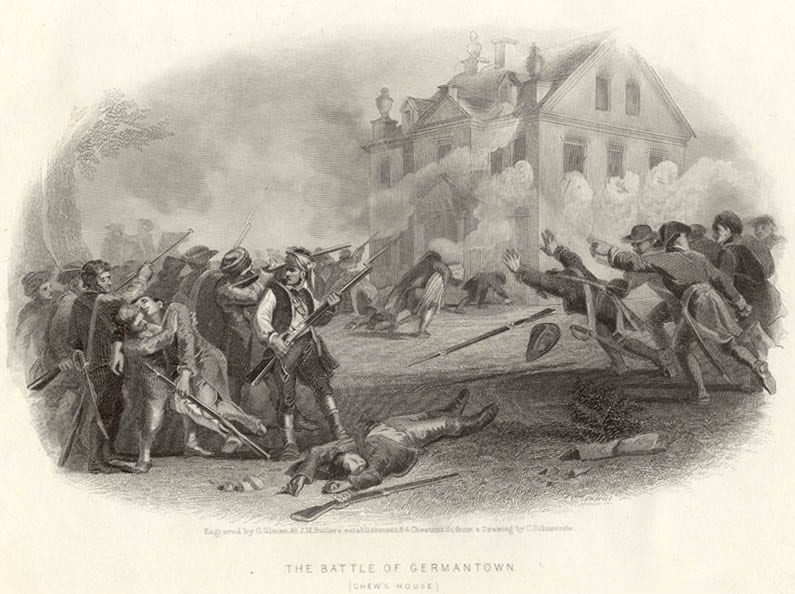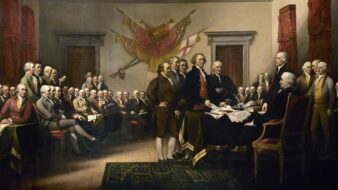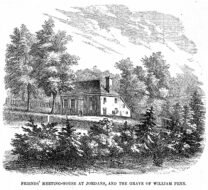
No study questions
No related resources
The most important portions of Bernard’s proposals are reprinted below from the original edition.
1. The Kingdom of Great Britain is imperial; that is, sovereign, and not subordinate to or dependent upon any earthly power.
2. In all imperial states there resides somewhere or other an absolute power, which we will call the Sovereignty.
3. The Sovereignty of Great Britain is in the King in Parliament; that is, in the King acting with the advice and consent of the Lords and the Commons (by their Representative), assembled in the Parliament of Great Britain.
4. The King in Parliament has the sole right of legislation, and the supreme superintendency of the government; and, in this plentitude of power, is absolute, uncontrollable, and accountable to none; and therefore, in a political sense, can do no wrong.
9. The Kingdom of Great Britain has, belonging to and depending upon it, divers external dominations and countries; all which together with Great Britain, form the British Empire. Let, therefore, the British Empire signify the aggregate body of the British dominions, and the Kingdom of Great Britain the island which is the seat of the government.
10. The King of the Parliament, is the sole and absolute Sovereign of the whole British Empire.
11. No members of the British Empire, other than the Parliament of Great Britain, can have a right to interfere in the exercise of this Sovereignty, but by being admitted into the Parliament, as Wales, Chester, and Durham have been, and Ireland may be.
12. Such a union is not necessary to the generality of the British external dominions; but it may be expedient with most of them.
13. The external British dominions, without such a union, are subordinate to and dependent upon the Kingdom of Great Britain, and must derive from thence all their powers of legislation and jurisdiction.
14. Legislation is not necessary to an external and dependant government; jurisdiction is necessary and essential to it. Therefore,
15. A separate Legislation is not an absolute right of British subjects residing out of the seat of Empire; it may or may not be allowed, and has or has not been granted, according to the circumstances of the community.
16. Where it is granted allowed, it must be exercised in subordination to the Sovereign power from whom it is derived.
17. No grant of the power of Legislation to a dependant government, whether it comes from the King alone, or from the Parliament, can preclude the Parliament of Great Britain from interfering in such dependent government, at such time and in such matter as they shall think fit.
29. The rule that a British subject shall not be bound by laws, or liable to taxes, but what he has consented to by his representatives, must be confined to the inhabitants of Great Britain only; and is not strictly true even there.
30. The Parliament of Great Britain, as well from its rights of Sovereignty as from occasional exigencies, has a right to make laws for, and impose taxes upon, its subjects in its external dominations, although they are not represented in such Parliament. But,
31. Taxes imposed upon the external dominations ought to be applied to the use of the people, from whom they are raised.
36. The colonies ought, so far as they are able, to pay the charge of the support of their own governments, and of their own defense.
37. The defense of the American colonies, being now almost wholly a sea service, is connected with the defense of trade. Therefore,
38. Duties upon imports and exports, make the most proper funds for the expenses of such defense. And,
39. It being the proper business of the Parliament of Great Britain, to establish and determine the necessary regulations and restrictions of the trade of their external dominions; and the duties upon the American imports and exports being interwove with the regulations and restrictions of trade; the imposition of such duties is the proper business of the Parliament.
40. The port duties being most properly applicable to the defense of the colonies, it remains that the support of the governments be provided for by internal duties.
44. Although the right of the Parliament of Great Britain, to raise taxes in any parts of the British Empire, is not to be disputed; yet it would be most advisable to leave to the Provincial Legislatures the raising the internal taxes.
45. If the sums required were fixed, there would be no inconvenience in letting the Provincial Legislature determine the manner in which they shall be raised.
46. It will be more agreeable to the people, that the necessary internal taxes should be raised by the Provincial Legislatures; as they will be most able to consult the particular convenience of their respective provinces. Whereas,
47. It may be difficult to form a general Parliamentary tax, so as to make it equally suitable to all provinces.
48. It would make it more agreeable to the people, though the sum to be raised was prescribed, to leave the method of taxation to their own legislature.
49. If the Provincial Legislatures should refuse to raise the sums required for the support of government, or should insist upon doing it by improper means, the Parliament might then take the business into their own hands.
50. But it is most probable that the people would acquiesce in this measure, and would soon be reconciled to it, when they observed the good effects of a certain and adequate establishment for the support of government. For,
51. The want of such an establishment has had bad consequences in many of the governments of the American colonies, and has contributed more than all other things put together, to contention in the legislature, and defect of justice in the courts of law. Therefore,
52. The establishment of a certain, sufficient, and independent Civil List, is not only expedient, but necessary to the welfare of the American colonies.
53. Such an appointment will tend greatly to remove all the seeds of contention, and to promote a lasting harmony and good understanding between the government and the people.
59. The subjects of the British Empire, residing in its external dominions, are entitled to all the rights and privileges of British subjects, which they are capable of enjoying.
60. There are some rights and privileges which the British subjects, the external dominions, are not equally capable of enjoying with those residing in Great Britain.
61. The right of having a share in the Imperial Legislature, is one of these incapacities in those external dominions, where a representation is impracticable.
62. A representation of the American colonies in the Imperial Legislature is not impracticable: and therefore,
63. The propriety of a Representation of the American colonies in the Imperial Legislature, must be determined by expediency only.
64. A representation of the American colonies, in the Imperial Legislature, is not necessary to establish the authority of the Parliament over the colonies. But,
65. It may be expedient for quieting disputes concerning such authority, and preventing a separation in the future times.
66. The expediency of American Legislatures, does not arise from the want of their having representatives in the Imperial Legislature.
67. If the American colonies had representatives in Parliament, still there would be an occasion for provincial Legislatures, for their domestic economy, and the support of their governments. But,
68. All external Legislatures must be subject to, and dependent on, the Imperial Legislature: otherwise there would be an Empire in and Empire.
70. The same form of Government is not equally proper to a colony in its infant and in its mature state.
72. There is but one perfect form of government for Provinces arrived at maturity.
73. That is the most perfect form of Government for a dependent province which approaches the nearest to that of the sovereign state, and differs from it as little as possible.
74. There is no such form of government among the American colonies and therefore,
75. Every American Government is capable of having its constitution altered for the better.
85. To prevent revolts in future times (for there is no room to fear them in the present) the most effectual means would be, to make the governments large and respectable, and balance the powers of them.
86. There is no government in America at present, whose powers are properly balanced; there not being in any of them a real and distinct third legislative power mediating between the King and the people, which is the peculiar excellence of the British Constitution.
87. The want of such a third Legislative power, adds weight to the popular, and lightens the royal scale: so as to destroy the balance between the royal and popular powers.
88. Although America is not now (and probably will not be for many years to come) ripe enough for a hereditary Nobility; yet it is now capable of a Nobility for life.
89. A Nobility appointed by the King for life, and made independent, would probably give strength and stability to the American governments, as effectually as an hereditary Nobility does to that of Great Britain.
90. The reformation of the American governments should not be controlled by the present boundaries of the colonies; as they were mostly settled upon partial, occasional, and accidental considerations, without any regard to a whole.
91. To settle the American governments to the greatest possible advantage, it will be necessary to reduce the number of them; in some places to unite and consolidate; in others to separate and transfer; and in general to divide by natural boundaries instead of imaginary lines.
95. The American colonies, in general, are at this time arrived at that state, which qualifies them to receive the most perfect form of government, which their situation and relation to Great Britain make them capable of.
96. The people of North America, at this time, expect a revisal and reformation of the American governments, and are better disposed to submit to it than ever they were, or perhaps ever will be again.
97. This is therefore the proper and critical time to reform the American governments upon a general, constitutional, firm, and durable plan; and if it is not done now, it will probably every day grow more difficult, till at last it becomes impracticable.

Conversation-based seminars for collegial PD, one-day and multi-day seminars, graduate credit seminars (MA degree), online and in-person.






























































































































































